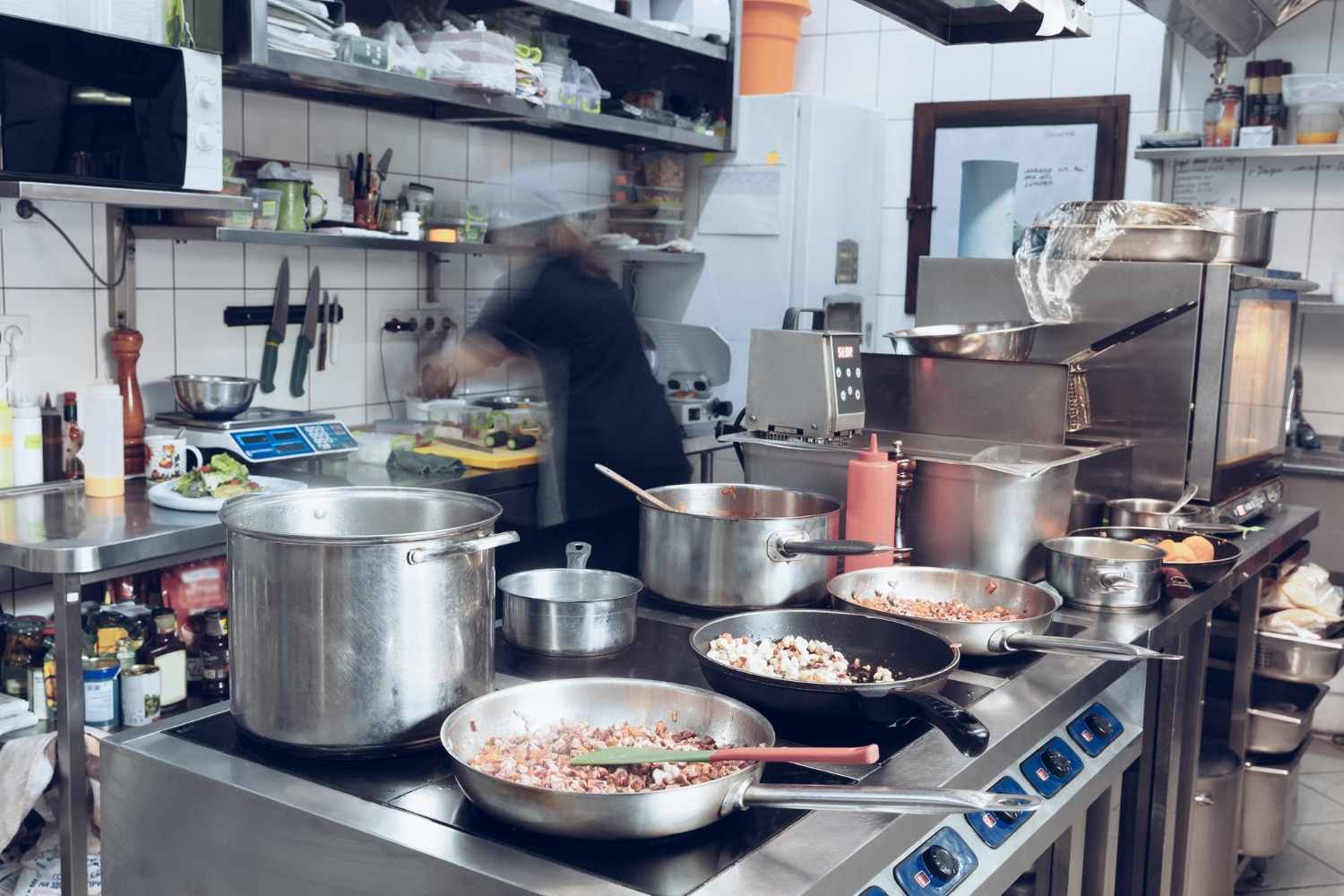
Introduction:
The world of cooking is undergoing a transformation, driven by the rapid rise of AI-powered Smart Kitchen Appliances Market. As consumer demand for convenience, efficiency, and precision grows, AI is stepping in to revolutionize the traditional cooking methods that have been passed down for generations.
From smart ovens and refrigerators to AI-driven cooking assistants, these innovations are reshaping how we cook, manage food, and interact with our kitchens.
1. The Rise of AI-Powered Smart Kitchen Appliances
Artificial intelligence (AI) has become a cornerstone of modern technology, and the kitchen is no exception. AI in the kitchen can be found in a wide range of appliances, such as smart ovens, refrigerators, coffee makers, and dishwashers. These appliances utilize advanced algorithms, machine learning, and deep learning techniques to provide enhanced features and automation that simplify the cooking process.
AI-powered smart kitchen appliances are designed to analyze data, learn from user behavior, and optimize cooking techniques for improved results. Whether it's suggesting recipes based on available ingredients, adjusting oven temperatures automatically, or notifying users when food is nearing expiration, AI in the kitchen is all about enhancing user experience and making meal preparation more efficient.
2. Traditional Cooking Methods vs. AI-Powered Cooking
Traditional cooking methods are often based on age-old techniques, honed over centuries, and passed down from generation to generation. These methods rely on the cook's skill, experience, and intuition to create flavorful meals. However, as lifestyles change, many consumers are turning to smart technology to simplify and enhance the cooking experience.
Here’s how AI-powered kitchen appliances compare to traditional cooking methods:
a) Precision and Consistency
Traditional cooking methods are typically guided by experience, with cooks using their senses—taste, smell, sight, and touch—to determine the perfect cooking conditions. While this can result in delicious, home-cooked meals, the level of precision and consistency can vary from person to person and dish to dish. Factors such as the cook's skill level, ambient temperature, or even ingredient quality can affect the outcome.
On the other hand, AI-powered appliances are designed to provide consistent and precise results. For instance, a smart oven powered by AI can automatically adjust the cooking time and temperature based on the recipe selected or the food being cooked. Many of these ovens also feature smart sensors that monitor the internal temperature and adjust settings to ensure perfect cooking every time. This takes the guesswork out of cooking, allowing even inexperienced home cooks to achieve professional-level results.
b) Efficiency and Time-Saving
Traditional cooking often requires hands-on work, such as chopping, stirring, and monitoring dishes throughout the cooking process. While this can be enjoyable and rewarding for those who have time to spare, it can be a challenge for busy individuals and families. Traditional methods also demand significant attention, which can be difficult to maintain when juggling multiple tasks.
AI-powered appliances excel in time-saving efficiency. With features like automated cooking schedules, smart timers, and remote control via apps, AI appliances streamline the cooking process. For example, a smart oven can be preheated remotely through a smartphone app, allowing users to start cooking immediately upon arrival at home. Additionally, AI-powered slow cookers or pressure cookers can automate cooking tasks such as stirring or adjusting heat levels, enabling a more hands-off experience. This is a significant departure from traditional cooking, where constant monitoring and manual adjustments are necessary.
c) Recipe Suggestions and Personalization
One of the challenges of traditional cooking methods is the constant need for recipe inspiration, especially when you're trying to make use of leftovers or ingredients on hand. Traditional recipes often require cooks to follow detailed instructions, which can be limiting, especially for novice chefs.
AI-powered kitchen appliances address this limitation with personalized recipe suggestions. Smart refrigerators can scan your inventory and recommend recipes based on the ingredients available. For instance, an AI-powered refrigerator may detect that you have chicken, bell peppers, and rice, and suggest a chicken stir-fry recipe. The refrigerator might even send a shopping list to your smartphone if certain ingredients are missing. These suggestions can be tailored to personal preferences, dietary restrictions, or previous cooking history, offering a level of customization that traditional methods cannot.
Moreover, AI appliances such as smart ovens or multi-functional cookers often come with built-in recipe libraries, guiding users through step-by-step cooking processes, complete with adjustable settings and real-time cooking adjustments. This level of personalization and flexibility is something that traditional cooking methods lack, where recipes tend to be fixed and inflexible.
d) Waste Reduction and Food Management
In traditional kitchens, food waste is often a byproduct of poor planning or improper food storage. Leftovers can be forgotten in the back of the refrigerator, leading to spoilage. Additionally, traditional cooking methods don’t always take into account the optimal storage conditions for food, which can result in food waste.
AI-powered appliances are tackling this issue by introducing smart food management systems. For example, smart refrigerators with AI capabilities can track the contents inside and notify users when items are nearing expiration. They can even suggest recipes to use up ingredients that might otherwise go to waste. Some smart fridges are equipped with internal cameras that take inventory and let users remotely view the contents via a smartphone app, allowing them to keep track of food items more efficiently.
Furthermore, AI-driven cooking appliances can recommend portion sizes based on the number of servings needed, reducing the chances of cooking too much food. By using AI to optimize meal planning and food storage, users can make better decisions that align with sustainable practices and minimize food waste.
e) Learning and Adaptability
Traditional cooking relies heavily on the cook's intuition and experience, meaning that learning new skills or techniques takes time and practice. Mistakes in the kitchen can lead to frustration, especially when the results are not as expected. This can make cooking seem daunting, especially for beginners.
AI-powered appliances are adaptive and constantly learning, making the cooking experience easier and less stressful for users. For instance, smart ovens equipped with AI technology can adjust their cooking settings based on user feedback. If a user prefers their pizza extra crispy, the oven can "remember" that preference for future meals. Over time, AI appliances learn users’ preferences, making the cooking process more intuitive and tailored to individual tastes.
Additionally, AI systems can guide new users by offering cooking tips, tutorials, and troubleshooting suggestions. This is particularly beneficial for novice chefs or those trying to master complex cooking techniques.
3. The Benefits of AI-Powered Smart Kitchen Appliances
AI-powered smart kitchen appliances offer a host of benefits that go beyond the scope of traditional cooking methods. These benefits are transforming kitchens worldwide and helping users streamline their cooking experiences. Some key benefits include:
a) Increased Convenience
AI-powered appliances provide convenience in several ways. Remote control via apps, automatic cooking settings, personalized recipe suggestions, and voice assistant compatibility all contribute to an easier cooking experience. With AI appliances, users don’t need to be glued to their kitchen counters—they can start cooking from anywhere, at any time.
b) Enhanced Cooking Accuracy
AI-powered appliances ensure greater cooking precision and consistency. Whether it's setting the ideal temperature for baking or determining the right time to flip a steak, AI technology guarantees that every meal is cooked to perfection. This is especially helpful for those new to cooking or those trying to achieve specific culinary results.
c) Healthier Meals
With built-in recipe suggestions, users can opt for healthier, more balanced meals. Some AI-powered appliances also offer cooking modes that reduce the need for excess oil or fat, promoting healthier eating habits. For example, smart air fryers cook food with little to no oil, making them a healthier alternative to deep frying.
d) Cost and Energy Savings
AI-powered appliances optimize energy usage, which can lead to cost savings over time. Smart refrigerators adjust temperature settings based on usage patterns, while smart ovens use less energy by automatically reducing heat when not needed. These devices contribute to lower electricity bills and more sustainable living.
4. The Future of Cooking: AI and Beyond
As AI technology continues to evolve, the future of cooking looks more exciting than ever. Smart kitchens powered by AI will likely become even more integrated, with appliances communicating with each other to create a seamless cooking environment.
For example, your refrigerator could send information about your food stock to your oven, suggesting recipes that use those ingredients. Additionally, AI could be used to develop more personalized meal plans based on dietary preferences, allergies, and health goals.
In the coming years, AI-powered cooking appliances will likely become more intuitive, adaptive, and accessible, making it easier for anyone to cook like a professional chef, regardless of their skill level.
Conclusion
AI-powered smart kitchen appliances are having a profound impact on traditional cooking methods, offering a new level of convenience, precision, and efficiency.
While traditional cooking methods have their merits, AI technology enhances these practices by automating tasks, offering personalized experiences, and reducing food waste.
As the smart kitchen appliances market continues to grow, we can expect even more advancements in AI technology, further reshaping the way we cook, eat, and manage our kitchens. Whether you’re a seasoned chef or a beginner, the integration of AI in the kitchen is transforming the cooking experience for the better.











Write a comment ...